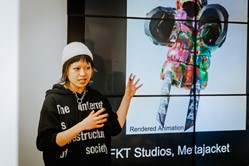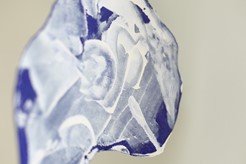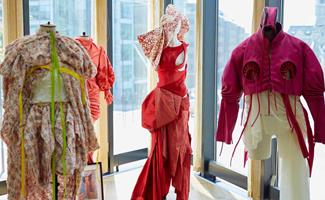Fashion trends, as we know them, are undergoing a transformative process. One aspect gaining particular attention is the emphasis on sustainability. The industry is gradually leaning towards eco-friendly materials and cruelty-free practices and this growing awareness of environmental impact is steering fashion towards a more conscientious path.
As well as sustainability, there is a noticeable mix of tradition and technology. The future of fashion envisions clothing that not only serves aesthetic purposes but also incorporates functional elements.
Read on to find out more about the top new fashion trends causing key shifts in the ever-evolving landscape of style.
What’s next in the world of fashion?
Expectations of fashion and fashion businesses are changing. Consumers don’t want brands to be complacent and wait to see what’s trending, they want them to take action and find ways to bring new and innovative ideas to the table.
With a new generation of consumers on the rise, the fashion industry is starting to make changes to accommodate the shift from always having the latest to a more mindful and sustainable approach, a focus on quality rather than cheaper price points, and incorporating technology into the fashion sphere.
Sustainability in fashion
One of the biggest trends sweeping through the world of fashion is sustainability and the use of eco-friendly materials. The future of fashion will incorporate a wardrobe that not only cares about aesthetics but also ethical practices and the environment in mind.
Eco-friendly fabrics and cruelty-free materials are no longer just buzzwords but pillars supporting the foundation of conscientious style. As consumers increasingly prioritise ethical choices, the industry adapts, offering garments that echo a commitment to both fashion and the planet.

Combining technology and fashion
As the world slowly becomes a more digital landscape, technology will undoubtedly have an effect on the world of fashion as well. Brands are already starting to experiment with digital fashion, creating styles for video games and other online virtual realities like the Metaverse.
Companies like The Fabricant and DressX are experimenting with the potential of digital clothing that consumers can wear as their virtual selves online.
Smart textiles and augmented reality are set to revolutionise the way we perceive and interact with our attire. From clothes that adapt to environmental conditions to accessories that serve as personal interfaces, the fashion of tomorrow is as much about utility as it is about style.

Timeless minimalism
A mix between minimalism and maximalism is also starting to arise as a top future fashion trend. The fashion industry is starting to see a departure from the extremes, favouring a more balanced approach that celebrates both simplicity and extravagance. Expect to see clean lines and timeless silhouettes coexisting with bold patterns and vibrant hues.
This trend also goes hand in hand with more sustainable approaches, using a “less is more” mindset. This concept extends beyond design aesthetics and advocates instead for mindful consumption.
In the future, minimalist fashion isn't just about reducing visual clutter, it's about making thoughtful choices that contribute to a more sustainable and eco-conscious industry.
Personalisation
The days of one-size-fits-all are beginning to fall, making room for a more individualistic approach to fashion. Whether it's through customisable designs or algorithm-driven recommendations, the future wardrobe will become unique to everyone.
Technology, once again, plays a pivotal role in ensuring that your style is an authentic extension of your personality. Around 80% of consumers want fashion retailers to accommodate their needs and preferences. This has caused a rise in brands turning to technology to reshape experiences for their customers.
H&M for example have implemented a chatbot that will not only answer customers' queries but also recommend styles based on answers to a series of questions.

Resale-as-a-service (RaaS)
As we step into a more honest era of fashion, the resurgence of resale-as-a-service emerges as a defining trend. This shift goes beyond the traditional retail model, offering a sustainable alternative to fashion consumption.
Resale platforms, powered by advanced algorithms and user-friendly interfaces, transform the act of buying and selling into a seamless and rewarding experience. It provides brands with a streamlined avenue to resell garments, fostering a more environmentally conscious business model.
Brands like Patagonia and ThredUp are embracing RaaS to directly engage with their consumer communities and contribute to a sustainable fashion future.
The future of fashion is unpredictable as always but is definitely taking unique strides as businesses begin to incorporate more individuality for their consumers, a range of technological advancements, and a focus on sustainability.
The London College of Contemporary Arts always strives to provide its students with the most up-to-date information regarding the ever-changing world of fashion. If you are interested in fashion business and looking to consolidate your understanding, check out the MA Fashion Business and Management course.
This course has been designed to provide students with the strategic fashion business management skills and knowledge needed to excel in today’s fashion industry.
Click here to learn more.


 Top 5 Fashion Career Opportunities after Graduation
Top 5 Fashion Career Opportunities after Graduation  Is the fashion industry becoming more inclusive in 2022?
Is the fashion industry becoming more inclusive in 2022?  What are the Latest Trends in Fashion Media Promotion?
What are the Latest Trends in Fashion Media Promotion?  The Ultimate Guide to Fashion Marketing
The Ultimate Guide to Fashion Marketing